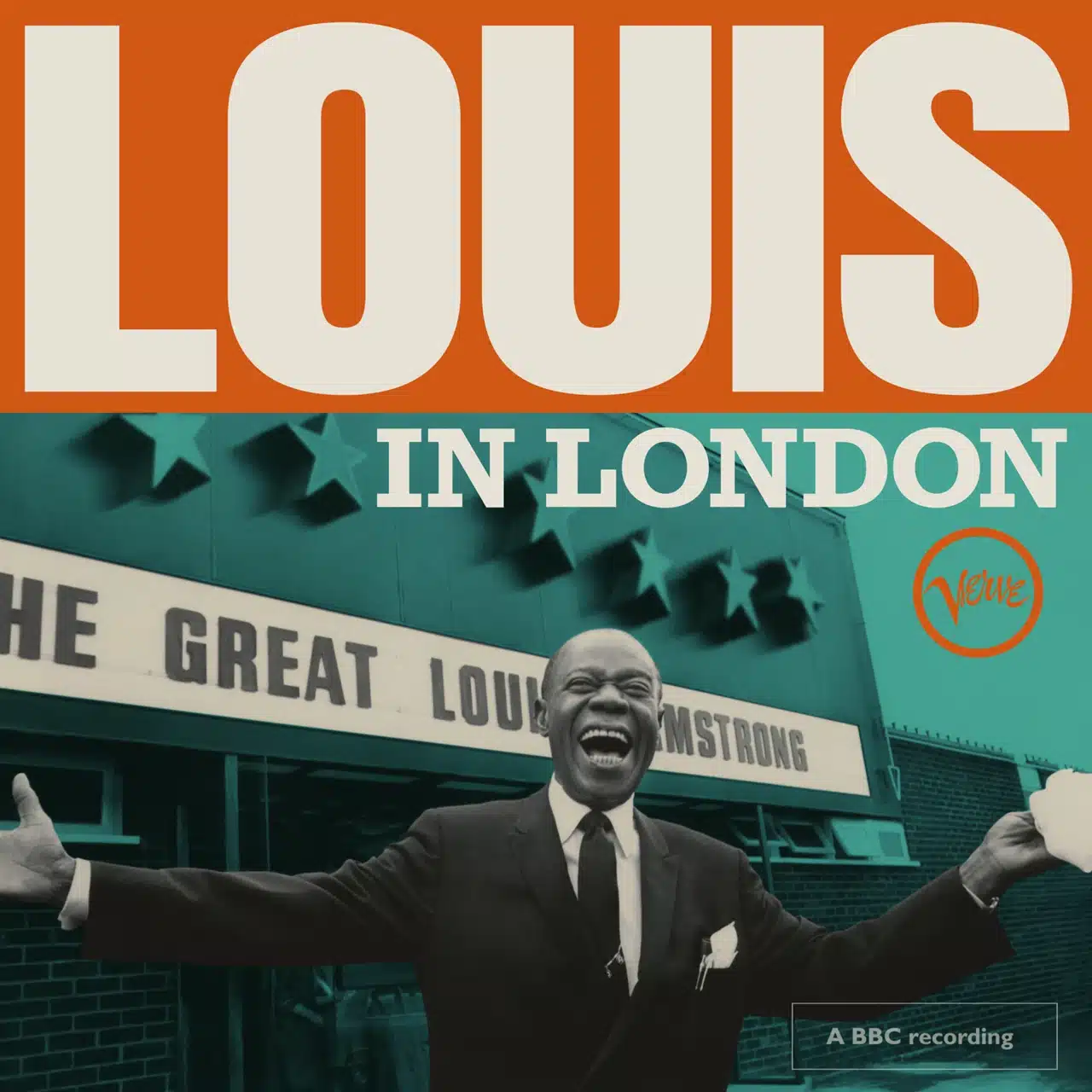Allow me to suggest why this album, so extrovert, exuberant and life-enhancing, carries a poignant postscript.
Sometime during 1968, 70-year-old Louis (always ‘Lewis’, not ‘Lou-ee’) Daniel Armstrong, internationally celebrated as ‘Satchmo’, is warned by doctors that he’s no longer superhuman and playing 300 strenuous concerts annually across the globe might not be conducive to a longer life.
So, Armstrong relents and sheds weight until a working men’s club in Batley, Yorkshire (yes, you read that correctly) offers him a gig at £10,000 a week (a sizeable fee in the sixties). Following Batley, he’s engaged to play a couple of large London venues and booked to record a BBC-TV show. This CD supplies the soundtrack.
On their 625-line black and white screens, dedicated Armstrong-watchers spot a slimmer-line Louis than before. Diminished in girth, but not in talent, although he’s favouring less trumpet and more gravelly singing (gravel, maybe, but it should never be forgotten that Armstrong’s vocal versions of Hello Dolly and What A Wonderful World twice knocked the Beatles from their No 1 position on the charts).
A phenomenon like Louis Armstrong, with his personal combination of talent, sincerity and charisma, doesn’t happen often (charisma? Watch him upstage Bing Crosby, Frank Sinatra and Grace Kelly in the movie ‘High Society’. See him wrest attention from über-star Barbra Streisand in ‘Hello Dolly’). Born poverty-stricken in New Orleans, by the 1920s, he electrifies Chicago with his astounding trumpet chops, musicality and rhythmic genius, inventing fresh language and grammar for jazz and pop, both instrumental and vocal. By the late 1930s, Armstrong is an entertainer, global sensation and, in all probability, the most famous African American in the world.
During the mid-1940s, the costly contraction of the big band business persuades Armstrong’s hard-headed management to surround him with a touring sextet, the All-Stars, whose constituents change over the years. On this particular night in July, 1968, the line-up is trombonist Tyree Glenn, Joe Muranyi on clarinet, Marty Napoleon, piano, Buddy Catlett, bass and Danny Barcelona on drums.
The All-Stars open with Armstrong’s signature When It’s Sleepy Time Down South (considering its original borderline racist lyric which, incidentally, Armstrong alters, it’s surprising to learn that the song was written by Clarence Muse and Leon and Otis René, a trio of Black composers). As ever, Armstrong segues into his usual greeting: “g’d evenin’ everybody”. He means it because his sincerity conquers the shtick.
Jazz is never absent. When the frontline of trumpet, trombone and spiky clarinet propel themselves into a romping Indiana, Marty Napoleon channels Earl Hines and ex-Ellingtonian, Tyree Glenn, offers some fine trombone work. Throughout the concert, Armstrong’s tone and attack, even at the advanced age of 70, define the term ‘majestic’.
On a personal note, it pleases this reviewer that they included A Kiss To Build A Dream On, a song from ‘The Strip’, a minor Mickey Rooney movie that permitted my 11-year-old self my first spine-tingling view of Armstrong (plus Earl Hines and Jack Teagarden) on the screen at the Empire cinema, Muizenberg, Cape Town, South Africa during the early throes of apartheid. A priceless and (to me, at least) inspiring time capsule.
Then, to the full pleasure of the audience, Hello, Dolly, one of the maestro’s Beatle-toppling hits, receives a vigorous knock-down-and-drag-out treatment offering no hint of a negative blip in Armstrong’s health. The All-Stars move into the title song Mame from the Broadway show but, in spite of their concerted effort, it never achieves the take-off success of Dolly.
In a rare moment of sentiment, Armstrong dedicates You’ll Never Walk Alone from Carousel to all the mothers of America whose sons are serving in Vietnam and proceeds to sing it with palpable emotion. The mood switches when the band roars into W. C. Handy’s Ole Miss, with ferocious solos all round, Joe Muranyi’s rasping tone suggesting that he is the clarinettist best suited to the band since the ineffable Ed Hall. In the closing choruses, Armstrong pirouettes around the beat and ensemble passages like a skilled gymnast.
Blueberry Hill is welcomed with applause and Glenn plays a natty obligato behind Armstong’s vocal. Kurt Weill’s Mack The Knife, an earlier mega-hit for Armstrong (he once said that the villains described in the song reminded him of characters from his youth in the rougher quarters of New Orleans), is also greeted like an old buddy.
When the All-Stars began, Armstong and Jack Teagarden’s high jinks during the vocal duet turned Hoagy Carmichael’s Rockin’ Chair into a concert favourite. Tyree Glenn steps into Teagarden’s shoes as the couple charm the crowd out of their socks.
Armstrong’s legendary ability to embrace an audience is amply demonstrated as he bounces into The Bare Necessities, a good-natured ditty he’s recorded for Disney’s ‘Jungle Book’ soundtrack. Then he works his alchemy on What A Wonderful World, another mega-hit, locating unexpected profundity in a banal lyric.
Finally, When The Saints Go Marching In, the traditional salute to his birthplace, New Orleans, leaves every member of the studio audience to return home in a state of ecstasy.
However, when Armstrong himself returns to his home to Corona, New York, his health takes a dramatic downturn. Not only does his BBC appearance prove to be his farewell to Britain, but also his farewell to global touring and his regular exchanges of mutual adoration with audiences worldwide. But his depressed spirit is raised when someone at the BBC sends him a tape of this concert. He becomes entranced, circulating copies to close friends and all the musicians involved.
Is there a reason why he revisits and replays the tape frequently until his death in 1971? Apart from the fact that it’s a pretty much faultless set, beautifully played, a vital part of its attraction is the appreciative audience from whom, in the absence of live audiences, the ailing Armstrong can continue to draw affection, even though it might be frozen on magnetic tape. Further clinching evidence: he labels the tape box ‘FOR THE FANS’.
Roger Hurll produced the show for BBC-TV and the ultimate guru on all matters Armstrongian, Ricky Riccardi, wrote the absorbing sleeve notes and produced the album with Ken Druker. The transfer was mastered by Kevin Reeves.
‘Louis In London’ is 100% vintage Satchmo. Accompanied by industrial quantities of poignancy.



4 responses
A terrific review Len – and a testament to Pops’ immortality as the ‘Shakespeare of Jazz’. Thank you! Digby Fairweather.
“The Bare Necessities, a good-natured ditty he’s recorded for Disney’s ‘Jungle Book’ soundtrack.”
I think not; though he did cover the song on the album “Disney Songs the Satchmo Way”
Oh dear, my slip. Sorry about that. Thanks for pointing out the error. LW
What a beautiful review for this incredible album!! I have already purchased several copies of the cd as “must have” gifts for friends. Thank you sir.